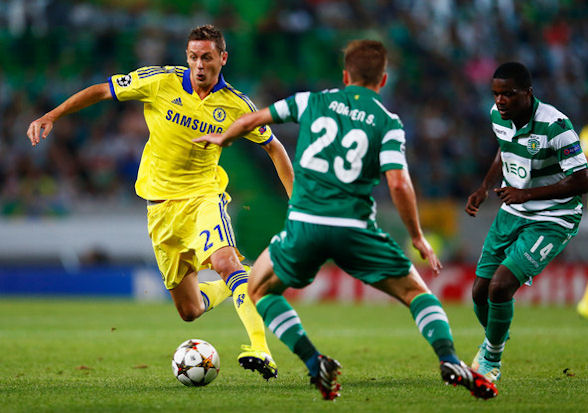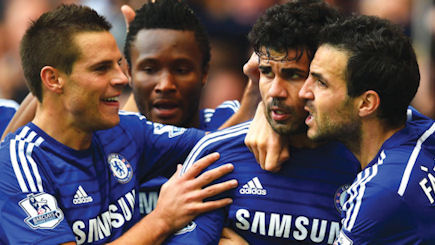This article first appeared in the Nov/Dec 2014 issue of World Gaming magazine.
It was a strange moment earlier this season when Manchester City boss Manuel Pellegrini bitterly labeled Chelsea a “small team” following an eventful 1-1 draw between the two title rivals at Etihad Stadium. Pellegrini and Chelsea manager José Mourinho have never had a great relationship and by labelling the Blues a small club the City boss was placing them in the same category as sides like Stoke City who “park the bus” in front of goal against the bigger clubs. Ironically, Mourinho was the man who first popularized the phrase “park the bus” in his first stint in England thanks to his typically defensive tactics, but the truth is that even those who dislike the controversial Portuguese must admit this is a very different Chelsea we’re witnessing this season.

After their problems in front of goal last season ultimately ruined any chance of lifting the Barclays Premier League trophy, Chelsea’s first six league games of this new campaign produced a staggering 19 goals. That’s seven goals more than Manchester City, who broke the Premier League’s single season goal tally last year, and 11 goals more than Liverpool, who also scored more than 100 times last term. Chelsea cruised to five wins and a draw from those opening six games with the only points dropped being against Pellegrini’s City side at Etihad Stadium, but with a three-point gap at the top of the EPL ladder and a five-point buffer over the defending champions it can hardly be said the Blues are a “small team”.
The obvious reason behind Chelsea’s sudden goal spree is the arrival this season of two crucial signings in Spanish duo Diego Costa and Cesc Fàbregas. The Blues had been pursuing Costa since Mourinho first returned to Chelsea over a year ago and although Atlético Madrid held onto him for the 2013/14 season, Mourinho’s confidence in eventually signing him this summer ensured he didn’t panic last season even in the midst of their striker crisis. Sure enough, Costa’s transfer to London had been confirmed as early as the Champions League final in May with the Spaniard gesturing an emotional farewell to fans after the match. Fàbregas’ arrival caught even the manager by surprise with Mourinho confessing he was shocked not only that Barcelona was willing to sell him but that the midfielder’s former club Arsenal passed on the chance to re-sign him after three years away.
Statistics after those first six games told the story. Costa’s eight goals was easily the most in the league, with Fàbregas comfortably topping the goal assists with six.

Costa is one of the most complete forwards in the world. He specializes not only in counter attack with his lighting speed and power, but also functions well in tight spaces when opponents “park the bus” thanks to his cunning instinct in the box and quality finishing. In many ways he reminds us of Luis Suárez last season, who boasted a rare ability to score from any angle at any time.
Fàbregas might have been a little too direct for Barcelona, but seems a perfect fit for the playmaker role at Chelsea and has been instrumental in two systems adopted by Mourinho this season. When playing away against Everton at Goodison Park or Manchester City at Etihad Stadium, the Blues opted for the more defensive 4-3-3 formation, with Fàbregas, Nemanja Matić and Ramires controlling the midfield, while Eden Hazard and Willian would usually feature on the flanks to support lone striker Costa. When they host lesser teams, such as Aston Villa, Matić and Fàbregas will play as two holding midfielders in a 4-2-3-1 system, with Oscar playing just ahead.
Costa and Fàbregas complete the jigsaw of Mourinho’s new Chelsea. The veteran manager was never going to win over famously impatient owner Roman Abramovich with defensive tactics in his second stint at Stamford Bridge and certainly attempted to play adventurous football from the outset last season, but was gradually forced to retreat when he found his strikers weren’t up to standard. Ironically, their most memorable game towards the end of the season was a 2-0 victory over Liverpool at Anfield when Chelsea’s “park the bus” tactics saw Brendan Rodgers lash out in the post-match press conference as the Reds’ title hopes crumbled. Nevertheless, Mourinho combined counter-attacking and an aggressive midfield press well and produced some spectacular football at times, such as in their 6-0 rout of Arsenal.

Mourinho boasts a “win at any cost” mentality. His first two seasons in England from 2004 yielded two Premier League titles for Chelsea, despite them scoring a moderate 72 goals in each of those two seasons. Their improvement in the offensive department this time around is obvious: were they to maintain the rate of 3.16 goals per game during those first six games for the duration they would finish the season with 120 goals and break the record of all the major European leagues!
It’s strange watching the Blues score goals by passing, moving and penetrating through condensed defenses but it is becoming more and more frequent to find yourself wondering whether they are in fact managed by Mourinho or the profoundly attack-minded Bayern Munich manager Pep Guardiola.
Abramovich’s demand for attacking football is behind Chelsea’s swift transformation from a pragmatic defensive unit under Mourinho back in 2004 to the offensive beast we see now. And the Russian billionaire is not the only man eager to witness beautiful football. Look at Liverpool, Southampton, Swansea, Tottenham Hotspur and even Aston Villa and Leicester City. Already renowned as one of the most attacking leagues in the world, the Premier League is shifting up another gear. In the latest North London Derby at Emirates Stadium, Arsenal manager Arsène Wenger angrily blasted Tottenham’s time-wasting, saying, “fans are on the stands to watch.” André Villas-Boas, who was once the most sought after manager in Europe thanks to his success at Porto, has spoken of his excitement whenever he heard his side’s fans yelling, “attack, attack, attack” from the stands. People want to watch attacking football, and Barcelona’s dominance over the last few years on the back of a lethal offensive unit has seen more and more club owners go in search of managers who adopt similar systems, such as Liverpool’s Rodgers and Everton’s Roberto Martínez.

That’s why this Chelsea side is so dangerous. Mourinho remains a well-balanced manager who won’t let the demands for outright attack impede his ability to employ the right tactics for the moment, but with the players now at his disposal to find the back of the net on a regular basis they have the best of both worlds. Unless injuries intervene, it’s hard to see anyone stopping them in their quest to return to the top of English football this season.







